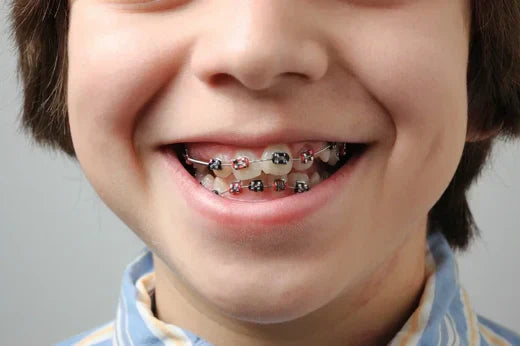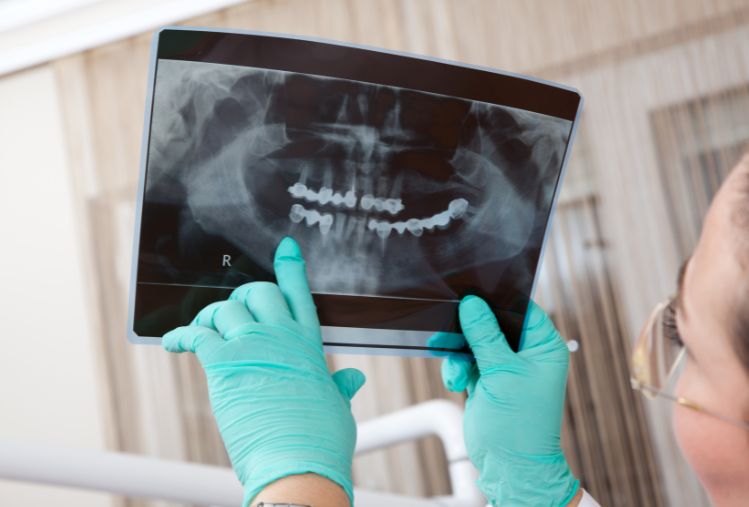
Table of Contents
-
Understanding Dental Development
-
Why Do Children Need Braces?
-
When Should You First Visit an Orthodontist?
-
What Is the Ideal Age for Braces?
-
Signs Your Child Might Need Braces
-
Crowded or Overlapping Teeth
-
Early or Late Loss of Baby Teeth
-
Biting and Chewing Issues
-
Mouth Breathing
-
Protruding Teeth
-
Types of Braces for Children
-
The Process of Getting Braces
-
Duration of Treatment
-
The Benefits of Early Orthodontic Treatment
-
Recap
-
FAQs
Orthodontic treatment for children has been preferred by several to address complications such as crowded, crooked, or poorly spaced teeth or jaws at an early age. Among the numerous questions, parents seek the answer to the exact age at which a child should get braces.
It is important to decide when the child should receive orthodontic treatment to ensure that their teeth can get the best outcomes. In this informative guide, you will discover the right age for getting braces, when your child may require them, and what are the types available to choose from.
Understanding Dental Development
Children's dental development progresses through distinct stages:
Primary Teeth (Baby Teeth)
These initial teeth begin to show in infancy and normally develop cavities at around the age of six years.
Mixed Dentition
This stage happens when the child gets both temporary and permanent teeth, even if the permanent teeth are still growing.
Permanent Teeth
Major children can develop all their permanent teeth by the age of thirteen.
Why Do Children Need Braces?
Kids need braces for different dental conditions such as misaligned teeth, spacing, overbite or underbite, or even how their upper and lower teeth fit together. Besides aesthetic purposes, braces also help promote oral health as those who have them can easily clean their teeth.
Getting braces at an early age is also important because as the child grows and these problems are not corrected, they can lead to more severe conditions.
When Should You First Visit an Orthodontist?
According to the American Association of Orthodontists, children should first visit an orthodontist before they are 7 years old. An orthodontist can tell at this age that the child may have a problem or not, even if the teeth seem to align properly. To evaluate the development of the jaw and teeth and to align them if necessary, a child needs to see an orthodontist regularly.
What Is the Ideal Age for Braces?
When should a child get braces? This is a question every parent wants an answer to, but it's also important to understand that the whole process depends on the child's prior dental health issues, if any. However, most children go for the treatment at the age of 9 - 14 years. This period is preferred because while the child is still young and growing, the permanent teeth have already erupted from the gums, and the jaw bones are still developing.
Best Age for Braces
The ideal age to have braces is the pre-adolescent or early adolescent stage; however, children can require early treatment, also known as Phase 1 treatment; starting at age 7. This early intervention can help tackle severe problems before they become worse.

Signs Your Child Might Need Braces
At times, it is difficult to determine whether the child needs braces, and here are some signs that will make the decision-making process easier for you. Here are the most common signs:
Crowded or Overlapping Teeth
This happens when the available space can only accommodate proper teeth alignment.
Early or Late Loss of Baby Teeth
If the child’s baby teeth fall out prematurely or are not knocked out before they’re supposed to fall out naturally, then the permanent teeth will likely face problems as they erupt.
Biting and Chewing Issues
Difficulty when biting or chewing food can be a sign that there is a misalignment issue.
Mouth Breathing
Habitual mouth breathing affects important aspects of jaw growth and tooth location.
Protruding Teeth
Protruding teeth are prone to accidents and an indicator of improper bite, which can be a major concern for children.
Types of Braces for Children
Here are the most common options:
Metal Braces
Traditional metal braces are the most effective orthodontic device. These are metal brackets and wires that gradually realign the teeth to their desired position.
Ceramic Braces
These braces function similarly to metal braces but the brackets are clear and blend in with the teeth. They are particularly preferred by many kids who feel conscious about wearing braces.
Clear Aligners
Clear aligners are specially designed dental trays that are hardly noticeable and ideal for older children and teens. However, they may not be appropriate for young kids or complicated cases.
Lingual Braces
These braces go at the back of the teeth and therefore are not visible. They are not as popular as the above appliances but can be a solution for kids who require extensive orthodontic treatment but do not want a visible appliance.
The Process of Getting Braces
Orthodontics is a several-stage process that starts with an assessment followed by consultation with an orthodontist.
Initial Consultation
The orthodontist will assess the baby's teeth, jaw development, and overall oral condition to make the right decision.
Impression and X-rays
Your child’s teeth are photographed and recorded in fine detail and impressions to give the necessary treatment accurately.
Fitting the Braces
Once the treatment plan is started, the orthodontist will place the braces. This involves placing bands or brackets fixed to the teeth by using wire.
Regular Adjustment
To ensure appropriate tooth mobility, the patient needs to visit the orthodontist for multiple follow-up appointments during treatment.
Retainers
As with braces removal, most patients need to wear retainers to keep the teeth in the new position.
Duration of Treatment
Orthodontic treatment using braces lasts for 18 months to 30 months. The duration is entirely based on the nature of the dental complications and the kind of brace work done.
The Benefits of Early Orthodontic Treatment
Starting orthodontic treatment at the right time offers numerous benefits:
Improved Oral Health
Misaligned teeth are more complex to clean and can cause tooth decay and other dental health issues.
Enhanced Appearance
Correct bite enhances facial aesthetics, confidence, and overall quality of life.
Better Functionality
Correcting bite issues enhances the capabilities of chewing and speaking.
Recap
Choosing the correct age for your child to wear a brace is a vital factor in his or her dental care process. The recommended age for the first evaluation is seven years but most children end up getting braces between nine and fourteen years. Early warning signs like crowded teeth or bite problems are signs that an orthodontist should check on your child.
FAQs
A: Normally, braces are not to be worn at the age of 7 years old. Nonetheless, the child should be taken for an orthodontic check-up to check for early signs of such a condition.
A: Braces are advised for children between the ages of 9 and 14 as the jaw is still developing and the majority of teeth have already fallen out.
A: According to the American Association of Orthodontists, you should contact an orthodontist for your child before they turn seven.






 Australia
Australia New Zealand
New Zealand Malaysia
Malaysia English
English Portuguese
Portuguese English
English English
English English
English English
English English
English Canada
Canada